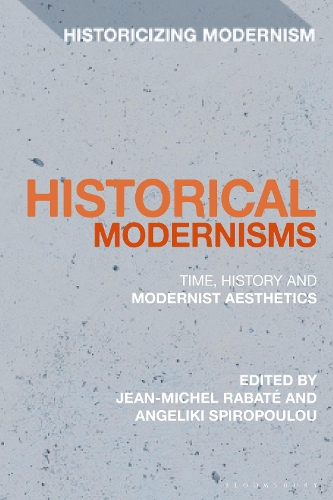
Historical Modernisms: Time, History and Modernist Aesthetics
(Hardback)
Available Formats
Publishing Details
Historical Modernisms: Time, History and Modernist Aesthetics
By (Author) Professor Jean-Michel Rabat
Edited by Angeliki Spiropoulou
Bloomsbury Publishing PLC
Bloomsbury Academic
18th November 2021
United Kingdom
Classifications
Tertiary Education
Non Fiction
Literary studies: fiction, novelists and prose writers
Literary studies: poetry and poets
Literary theory
809.9112
Physical Properties
Hardback
296
Width 156mm, Height 234mm
585g
Description
Examining the ways in which modernism is created within specific historical contexts, as well as how it redefines the concept of history itself, this book sheds new light on the historical-mindedness of modernism and the artistic avant-gardes. Cutting across Anglophone and less explored European traditions and featuring work from a variety of eminent scholars, it deals with issues as diverse as artistic medium, modernist print culture, autobiography as history writing, avant-garde experimentations and modernisms futurity. Contributors examine both literary and artistic modernism, combining theoretical overviews and archival research with case studies of Anglophone as well as European modernism, which speak to the current historicizing trend in modernist and literary studies.
Reviews
Modernism, as Terry Eagleton points out in his witty foreword to this volume, involves nothing less than the fashioning of whole new forms of human subjectivity. But this emphasis on newness and nowness conceals the dependence of modernism on the past. Even Ezra Pounds famous rallying cry Make it new implies a pre-existing it to be transformed anew. This volume brings together leading scholars to question the idea that modernism breaks free of the past or escapes what Joyces Stephen Dedalus calls the nightmare of history. Instead, these scholars show how modernism interrogates the methods and meanings of history, challenging any facile division between now and then. * Maud Ellmann, Randy L. and Melvin R. Berlin Distinguished Service Professor of English, University of Chicago, USA. *
This is a magnificent collection which conjugates modernism and history in marvellously illuminating essays. Modernism often promised to awake from the nightmare of history but it found it difficult to ignore its own historical origins. These essays which range from a reflection on the small magazines in which modernist writing found its most congenial setting to a consideration of Andre Breton as an office manager emphasise the very specific histories in which the general category of modernism took shape. * Colin MacCabe, Distinguished Professor of English and Film, University of Pittsburgh, USA *
Author Bio
Jean-Michel Rabat is a Professor of English and Comparative Literature at the University of Pennsylvania. One of the founders and curators of Slought Foundation in Philadelphia (slought.org), he is a managing editor of the Journal of Modern Literature. In 2008, he was elected a Fellow of the American Academy of Arts and Sciences. Rabat has authored or edited 38 books on modernism, psychoanalysis, contemporary art, philosophy, and writers like Beckett, Pound and Joyce. Angeliki Spiropoulou is Associate Professor of Modern European Literature and Theory at Peloponnese University, and Research Fellow at the School of Advanced Studies, University of London. She works on English and European modernism. She has authored or (co-)edited the books: Virginia Woolf, Modernity and History: Constellations with Walter Benjamin; History of European Literature 18th-20thC.; Culture Agonistes; and Walter Benjamin: Images and Myths of Modernity.
